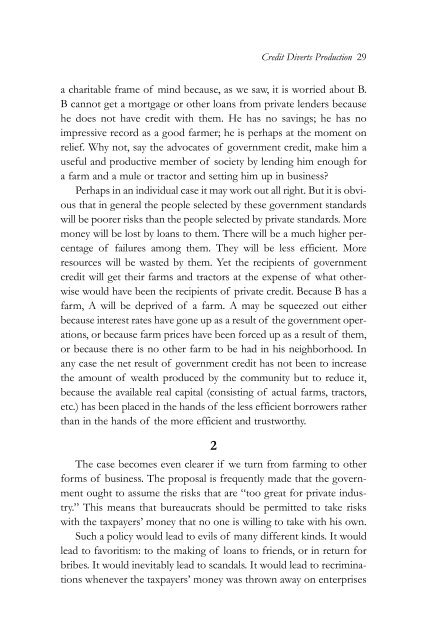1gDdM7w
1gDdM7w
1gDdM7w
- No tags were found...
Create successful ePaper yourself
Turn your PDF publications into a flip-book with our unique Google optimized e-Paper software.
Credit Diverts Production 29a charitable frame of mind because, as we saw, it is worried about B.B cannot get a mortgage or other loans from private lenders becausehe does not have credit with them. He has no savings; he has noimpressive record as a good farmer; he is perhaps at the moment onrelief. Why not, say the advocates of government credit, make him auseful and productive member of society by lending him enough fora farm and a mule or tractor and setting him up in business?Perhaps in an individual case it may work out all right. But it is obviousthat in general the people selected by these government standardswill be poorer risks than the people selected by private standards. Moremoney will be lost by loans to them. There will be a much higher percentageof failures among them. They will be less efficient. Moreresources will be wasted by them. Yet the recipients of governmentcredit will get their farms and tractors at the expense of what otherwisewould have been the recipients of private credit. Because B has afarm, A will be deprived of a farm. A may be squeezed out eitherbecause interest rates have gone up as a result of the government operations,or because farm prices have been forced up as a result of them,or because there is no other farm to be had in his neighborhood. Inany case the net result of government credit has not been to increasethe amount of wealth produced by the community but to reduce it,because the available real capital (consisting of actual farms, tractors,etc.) has been placed in the hands of the less efficient borrowers ratherthan in the hands of the more efficient and trustworthy.2The case becomes even clearer if we turn from farming to otherforms of business. The proposal is frequently made that the governmentought to assume the risks that are “too great for private industry.”This means that bureaucrats should be permitted to take riskswith the taxpayers’ money that no one is willing to take with his own.Such a policy would lead to evils of many different kinds. It wouldlead to favoritism: to the making of loans to friends, or in return forbribes. It would inevitably lead to scandals. It would lead to recriminationswhenever the taxpayers’ money was thrown away on enterprises


